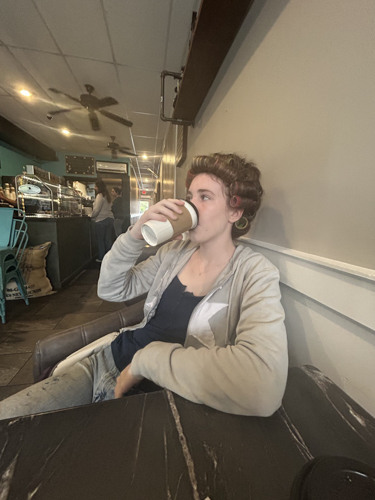by Mary Frances Ruskell
Jonathan, the line cook, splayed his elbows onto the bar top and plopped his chin into his hands. He smiled slowly until it overtook his face.
“You know there are ghosts in the central tower?”
Granby Grill was on the bottom floor of a side wing of an old cotton mill in Columbia, South Carolina, and through the big glass windows I could see the tower he was talking about. I didn’t know if I believed him, but it didn’t matter. I was hooked immediately, enthralled by the way he told the story, as I always was when he decided to go down one of his narrative rambles. He meandered between suspected history, unnatural noises, and tall tales from other people, finishing with a grand finale recounting his own trips through the upper levels of the massive brick building with a flashlight in hand.
I heard stories like this all the time as I stood behind the boozeless bar. Granby Grill had lost its liquor license, but there were still barflies. Never to be defeated by such a thing as a lack of beer on draft. They just brought their drinks in tumblers and coolers, and as I handed out chilled pint glasses from the freezer, they told old stories, rewashed and reworn. Stories they’d heard from a friend of a friend of a friend, and stories that both they and I knew could not be true.
Then one September afternoon, Granby Grill closed, unable to recover from the gash that a missing liquor license tears into the already tight profits of a greasy spoon.
Restaurants like Granby Grill are closing across South Carolina. The state requires that all businesses that sell alcohol must maintain a liquor liability insurance policy, as most states do. However, in 2017, South Carolina passed a law requiring businesses that serve alcohol past 5 p.m. to maintain at least $1 million in coverage.
The state’s joint and several liability laws also contribute to high insurance policies. If a restaurant or bar served a patron alcohol within twelve hours of said patron causing death, injury, or property damage while under the influence, the establishment could be held liable. Exacerbating this is an earlier ruling by the S.C. Supreme Court, allowing that in alcohol-related wrongful death and personal injury lawsuits, a defendant found to be partially responsible can end up paying the entire verdict. Insurance companies are wary of becoming involved in this potential firestorm, creating a tough environment for restaurants and bars with incredibly expensive policies.
While those who worry about the negative effects of alcohol on health and safety might see the positives of these legal changes, there’s an overlooked negative. A tragedy, even, especially in a state like ours and the times we find ourselves in. Third spaces are on the decline, and social connections are going down with them. Coined by Ray Oldenburg, a third space is a physical place, excluding work and home, where conversation is the main affair and there is an insignificant financial cost to entry.
Community is especially important now that phones have sunk their teeth into our every interaction. At Granby Grill, I had more conversations with people than I ever had before and have since.
Pubs, bars, and greasy spoons are full of talking. Full of storytellers. Conversation is how the long tradition of Southern literature started, and how it will hopefully last. The people of Granby Grill were laymen, but they could tell you a lesson better than a preacher. They told them through long tales, made beautiful and heart-wrenching through their patterns of speech, their word choice and order, and Southernisms that were so charming, beautiful, and so, so effective that I started writing them down, studying them like they were lecture notes. I’ve probably taken those stories and how they were told more seriously than any lecture. We need third spaces, to create the Southern novels and music and stories that are our literary culture.
Is it a stretch to worry that an insurance law threatens the future of the Southern literary tradition? I don’t think so. A child learns to talk when she is surrounded by speech. She listens and absorbs and one day can join in. How tragic it would be if we never gave another young Faulkner a chance if she were surrounded only by ghosts instead of barflies.

About Mary Frances Ruskell
Mary Ruskell is a senior at Heathwood Hall Episcopal School in Columbia, where Elise Hagstette is her AP English Language and Composition teacher. Mary loves little diners, thinking about the Bishopville Lizard Man, and bread pudding.